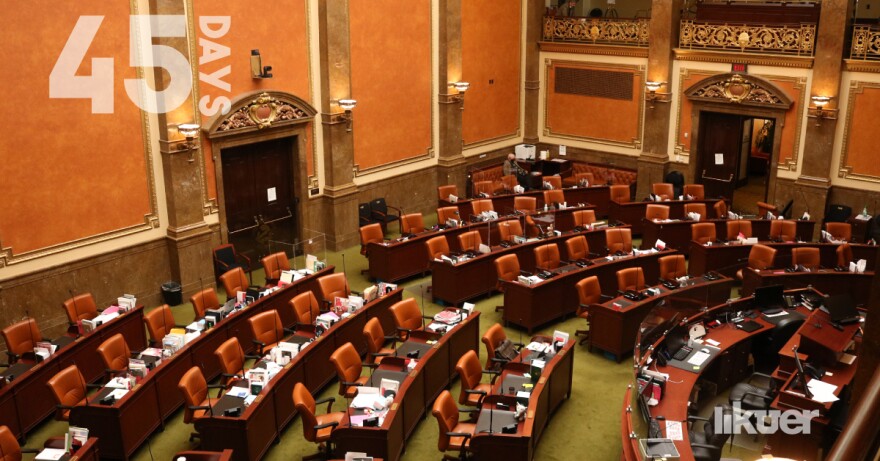That’s a wrap, folks! The 2021 General Session has come to a close, which means this season of 45 Days ends here as well. We introduced you to a lot of bills and issues over the past several weeks, and you might be wondering to yourself “What happened with that bill?” So this week we’re rounding up all the legislation we talked about. We’ll go through which ones are headed to the governor’s desk and which ones are dust in the wind. Plus, we’ll break down what all those new laws will mean for Utahns.
The Legislature passed 503 bills this session, and we obviously didn’t get through all of them on this podcast. Luckily, hosts Sonja Hutson and Emily Means rounded up an even more comprehensive list of all the bills that could have the biggest impact on Utah.
COVID-19:
✔️ Pandemic Endgame: Under this legislation, the statewide mask mandate would end on April 10, except for gatherings of 50 or more people where physical distancing isn’t possible. All other COVID-19 public health orders,, would be terminated when certain public health thresholds are met. Those thresholds are related to case rates, ICU capacity and the number of vaccine doses in the state. Public health orders related to K-12 schools would be repealed by July 1. Cox said he would not veto the bill.
Education:
✔️ In-person Prioritization: This bill changed a lot over the course of the session. Originally, it allowed parents to take their kids out of school districts that didn't offer in-person learning and still have their funding follow them wherever they enrolled, including in a private school. After several versions, the sponsor landed on a bill that requires colleges to offer at least 75% of their classes in person. It would also try to keep K-12 students in school by testing students during an outbreak and requiring only those who test positive to stay home.
✔️ Dixie State University Name Change: One of the more controversial bills this session was about changing the name of Dixie State University in St. George, because of the term Dixie’s ties to the Confederacy.
Funding: Within the first two weeks of the session, lawmakers added around $475 million to the public education base budget. In total, they’re spending more than $6 billion on education — around a quarter of the Legislature’s budget. The funding includes a 6% increase in the weighted pupil unit — a big component of per pupil spending — and $1,500 bonuses for teachers.
Affordable Housing
✔️ Accessory Dwelling Units: The Legislature approved a bill to make it easier to build accessory dwelling units, like mother-in-law and basement apartments. The proposal loosens some of the zoning and construction regulations. It also provides funding for loans to homeowners who want to build these types of apartments and rent them out to low-income tenants.
✔️ Homeless Services Restructure: Utah will have a new homeless council and services officer, under a bill passed by the Legislature. The intention is to streamline and coordinate homeless services and funding to more effectively address the issue throughout the state. In addition to the bill, legislative leaders also announced a partnership with local philanthropists. Together, they’re investing $730 million in addressing homelessness and affordable housing issues.
Mental Health:
❌ Mobile Crisis Outreach Teams: A proposal to almost triple the number of mobile crisis outreach teams failed in the Legislature. The teams are made up of therapists and social workers who go directly to someone who’s having a mental health crisis and try to help them on site. The legislation would have cost $4.2 million.
✔️ Mental Health Days: The Legislature passed a bill that makes mental and behavioral health a valid excuse for students to miss school.
Police Reform:
✔️ Use of Force Reporting: One police reform bill sailed through the Legislature without any trouble. It would require law enforcement agencies across Utah to collect data on use of force. The bill’s sponsor and advocacy groups like the Utah Fraternal Order of Police said more information was needed to understand if excessive force is a problem in the state.
❌ Riot Penalties: A bill that increased penalties for people arrested for rioting failed after passing the full Senate. It revoked bail for those people. One of the most controversial parts of the bill would’ve give immunity to drivers who hit or kill people while the driver is leaving a protest. The American Civil Liberties Union of Utah called it the “license to kill” bill.
❌ Qualified Immunity: Qualified immunity protects police officers from being sued. Ending it is one of the demands that came out of last year’s protests for police reform. A proposal by Utah’s House Minority Leader would have taken that on, but it was never given a hearing.
State Budget:
Infrastructure and education were big winners in the budget this year. The budget includes $115 million in one-time money for an infrastructure development account and around $100 million for state parks and trails. Lawmakers approved an increase of around $400 million for the public education base budget plus an additional $76.5 million in the General Session budget. The budget sets aside $50 million to address housing and homelessness issues, including refunding an affordable housing bill that lawmakers cut funding for over the summer.




